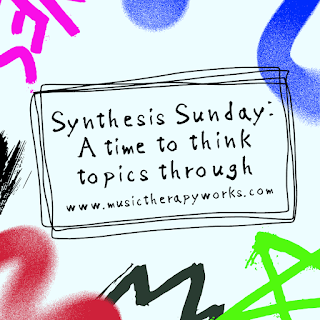Synthesis Sunday: Starting My Reading Up Again...
Last week, I set an intention to start reading my music therapy texts again, and this week (well, yesterday), I started the process. I actually need to give myself a bit more credit than this since I did identify all of the chapters in both of the books that I want to read this quarter and started my outline, but once I did that, I left it all alone until yesterday afternoon.
I started out with Karen Goodman's book on music therapy education and training, and I read the first chapter. This chapter, Music Therapy Education and Training in the United States, covered the history of how music therapy became an educational program in the U.S. Now, I have done much research in this area, so nothing here was a big surprise to me. I know most of the events and information that were listed. I am looking forward to the next readings - in both of the books I've selected (by the way, the citations are listed at the end of this post).
I have always been much more interested in the how we do our jobs than the why we do our jobs. I have never doubted the whys - I see the reasons for why we do our jobs during sessions all the time, but the hows have always eluded me. I know my reality and my hows, but I have limited insight into how others do their jobs. I have always been more interested in process rather than product. I am also interested in how my process produces my product, but I am even more interested in how your process produces your product.
The competencies are one of those processes that I think we touch on, but we do not always really completely use to our advantage. It will be interesting to see if Karen Goodman agrees with me (or did agree with me back in 2011 when the book was published) and/or if her ideas will support or challenge my own ideas of competency-based clinical training.
That is why I read these books. I read them to see what I can use in my own professional role. I find books about how we do our jobs much more valuable to my work than research articles where every single one ends with "this topic needs more research." I want practical information that I can apply to my role in the music therapy world when I am spending my time reading.
My interest in the AMTA Professional Competencies started with the establishment of AMTA. I started off my foray with several graduate projects aligning the current undergraduate curriculum at my alma mater with the newly formed competencies. I then aligned all of my internship programming with the competencies as well. I have never looked back from that. I have revised my assignments, changed my operational definitions, and taken ideas from updates (in fact, shouldn't we have had an updated version in 2018??) to attempt to help my interns experience all things clinical in their 1020 hours with me. I have shared my program with other music therapists - several find the work that I've done to be a good starting point for their own programs - both internship and educational coursework programs. My dissertation topic was going to be a compilation of all of the research that I have done on and with the competencies, but I never finished that course of study, so I never moved forward, but the interest is still there.
Thank you for writing these books, Karen Goodman and Carol Falender and Edward Shafranske. I am looking forward to learning from you and in response to what you have written.
Falender, C. A., & Shafranske, E. P. (2009). Clinical supervision: A competency-based approach. American Psychological Association: Washington, D.C.
Goodman, K. D. (2011). Music therapy education and training: From theory to practice. Charles C. Thomas: Springfield, IL.


Comments
Post a Comment